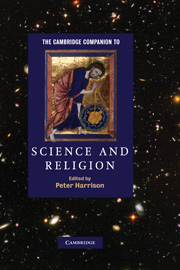Book contents
- Frontmatter
- Introduction
- Part I Historical interactions
- Part II Religion and contemporary science
- Part III Philosophical perspectives
- 11 Atheism, naturalism and science: three in one?
- 12 Divine action, emergence and scientific explanation
- 13 Science, God and cosmic purpose
- 14 Ways of relating science and religion
- A guide to further reading
- Index
13 - Science, God and cosmic purpose
from Part III - Philosophical perspectives
Published online by Cambridge University Press: 28 July 2010
- Frontmatter
- Introduction
- Part I Historical interactions
- Part II Religion and contemporary science
- Part III Philosophical perspectives
- 11 Atheism, naturalism and science: three in one?
- 12 Divine action, emergence and scientific explanation
- 13 Science, God and cosmic purpose
- 14 Ways of relating science and religion
- A guide to further reading
- Index
Summary
“. . . what exhilarates us human creatures more than freedom, more than the glory of achievement, is the joy of finding and surrendering to a Beauty greater than man, the rapture of being possessed.” (Teilhard de Chardin) / “The teleology of the Universe is directed toward the production of Beauty. Thus any system of things which in any wide sense is beautiful is to that extent justified in its existence.” (Alfred North Whitehead) / Jews, Christians and Muslims all believe that the universe is the temporal and spatial expression of an eternal meaning or purpose. In these traditions, authentic human life begins with a steady trust that something of everlasting significance is going on in the universe and that our own lives are connected to this larger drama. However, these same faith traditions are also aware that whatever purpose the universe might have can never be made completely clear to mortals. Why not? Because if there is a pervasive purpose in the universe, in order for it to give meaning to our own lives it would have to be larger and deeper than any human mind could fathom. At least, this is the teaching of all traditional theologies. Purpose, if real, would grasp us more than we could grasp it. We could encounter purpose only if we let it take hold of us and carry us away, just as we may have allowed a great symphony or poem to carry us away in its intoxicating beauty. We cannot appreciate a great work of art or allow it to have any impact on us unless we abandon the need to control it intellectually. The same would be true of cosmic purpose.
- Type
- Chapter
- Information
- The Cambridge Companion to Science and Religion , pp. 260 - 277Publisher: Cambridge University PressPrint publication year: 2010
- 1
- Cited by

